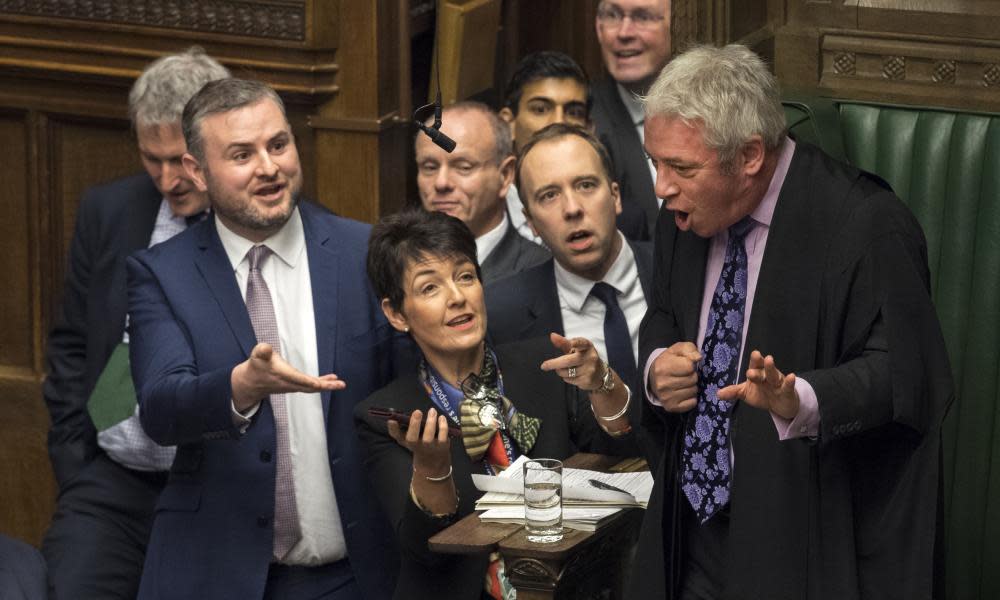How admirable that MPs want to amend Brexit. It won’t work

Constitutional folklore is notoriously unreliable. Liberal statesman John Bright, for instance, did not, as is so often claimed, declare in 1865 that the British legislature was “the mother of all parliaments”. That particular distinction he accorded to England. Likewise, and more importantly, it is not true that parliament is sovereign. That authority is vested in “the Queen-in-parliament”: which is to say, ministers of the Crown acting in tandem with the Commons and the Lords. The question, always, is where the balance between government and parliament lies.
Since the second world war, the general trend has been towards the aggregation of power in the executive. In 1976, former lord high chancellor Lord Hailsham went as far as saying we live in an “elective dictatorship”. Tony Blair’s chief of staff, Jonathan Powell, spoke of the creation of a “Napoleonic” state. Yet last week’s historic defeat of Theresa May’s Brexit deal in the Commons was a milestone in a quiet counter-revolution. Ever since Iraq, parliament has assumed that it has a right of veto over any significant declaration of military hostilities; select committees, though still no match for their US counterparts, have flexed their muscles.
And now, faced with May’s conspicuous inability to navigate the shoals of Brexit, the Commons is seeking to seize control of the process in ways that are poorly coordinated, strategically messy and by no means fated to succeed – but still hugely significant.
Here, then, is Dominic Grieve, the former attorney general, and Hilary Benn, chairman of the Brexit select committee, reaching across party lines to take charge of the Commons order of business, in a bid to stop a no-deal departure from the EU. Contentiously, they suggest that this outcome be ruled out by a plurality rather than a straightforward majority: 300 MPs, representing at least five parties, at least 10 of these members being subject to the government whip. This particular clause is beyond bespoke, ridiculously so: it will not survive parliamentary scrutiny. But the plan’s sheer radicalism is a measure of the animal spirits now coursing through the corridors of the lower house.
Here, too, are Nicky Morgan, Yvette Cooper, Oliver Letwin and others championing an amendment that would mandate the government to seek an extension to article 50 from the EU as an alternative means of avoiding – or at least postponing – a no-deal exit. And here, too, is John Bercow who, the Observer reports, is “seriously reflecting” upon his plan to step down as Speaker of the House this summer. Doubtless he is unimpressed by government sources briefing that he will be denied a peerage as a punishment for his splendidly imaginative and enlightened chairmanship of the Brexit debate. But I suspect he is also reluctant to leave the hot seat at the very moment that the chamber is beginning to hum with vitality and brio.

On Monday, May will present her next offer to the Commons, in advance of a further vote on the amended deal (at present scheduled for 29 January). The subtleties and nuance of compromise are alien to her character: you suspect that her DNA resembles not a double helix but a series of parallel railway tracks. On the “backstop” – the device to avoid a hard Irish border that would keep the UK in the customs union until the problem is resolved – the government is now proposing a separate deal with the Republic of Ireland as a means of extracting the issue from the proposed withdrawal agreement.
Yet it is hard to imagine the EU – for whom the backstop is an essential element in the diplomatic mix – assenting to such a ploy. And on Saturday, tánaiste Simon Coveney tweeted that the Irish government’s “commitment to the entire [withdrawal agreement] is absolute – including the backstop”. Thus, May’s supposedly cunning plan looks like procrastination at best and moonshine at worst.
The greater question is whether this energising burst of parliamentary self-assertion will break the logjam. At the very least, it is an exhilarating antidote to the slogan-packed rightwing populism of the Brexiteers. On Sunday’s Andrew Marr Show, the stony-featured trade secretary, Liam Fox, posed the following question: “Is government the servant of parliament or is government the servant of the people?” One of the last century’s many lessons is never to trust a politician who uses such language.
All the same, it is still very hard to see what proposals the Commons – for all its collective ingenuity – can muster that will command a majority and be acceptable to Brussels. In addition: so tightly geared is the parliamentary mechanism in this crisis that some of the amendments on the table could have distinctly unforeseen consequences. In the Mail on Sunday, for instance, Jacob Rees-Mogg, in a spectacularly disingenuous call for Tory unity, says that “even Mrs May’s deal would be better than not leaving at all”. Those MPs now pressing for no deal to be ruled out need to take this seriously. If their amendment is passed, they might become the unwitting enablers of Brexit – as hardline leavers decide that some form of departure is better than no departure at all.
Fox also objected to Marr that the “remainer” Commons was trying to thwart the result of the 2016 referendum: the most fetishised vote in modern British history. Inadvertently, he made the most important point of all. Having voted for Brexit three years ago, the public elected a House of Commons in 2017 that was never going to agree an orderly exit. That contradiction cannot be resolved by those who embody it. MPs are in a dark room, looking for a black cat, that isn’t there.
I simply ask: if there is any way of breaking this impasse that doesn’t involve a fresh referendum, will somebody please tell me what it is?
• Matthew d’Ancona is a Guardian columnist

 Yahoo News
Yahoo News 
